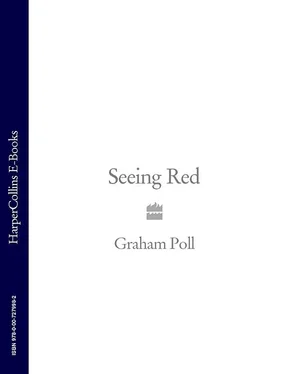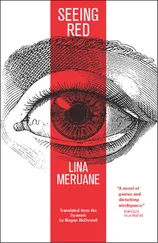I walked away and we finished the game. It was a draw. In his after-match media conference, José Mourinho was asked about what had happened with me. He said, ‘I was telling Mr Poll a couple of things I have had in my heart since the Tottenham game at White Hart Lane. But it was nothing special. I was cleansing my soul. I think he [Poll] was what he is always. He had a normal performance when he is refereeing a Chelsea match. Do we jump with happiness when Mr Poll comes? No, I don’t. I just say he is a referee Chelsea has no luck with. If we can have another referee we are happy. We do not like to have Mr Poll.’
There we are then. His noxious outburst was nothing special. It was just Mourinho cleansing his soul.
When I read what Mourinho had said, and considered how Clarke, Terry and the Chelsea manager had delivered the same ‘key message’, I did wonder whether it was all premeditated. Of course, Chelsea’s comments to me and about me that night might have all been just hot-headed reactions, but there were three potential benefits from their outbursts.
Firstly, a big row with me would dominate the headlines the next day and distract everyone’s attention from the real story of the night, which was that Chelsea were no longer champions. They had been forced by protocol to form a guard of honour for Manchester United at the start of the match. That hurt the Chelsea players and supporters and signalled José Mourinho’s failure.
Secondly, a confrontation with me, following the storm earlier in the season about John Terry’s sending off, would also ensure that I would not referee Chelsea again for a long time. Unaware that I was retiring, Mourinho did not like the fact that I stood up to Chelsea Football Club and that I refused to be intimidated. It was not difficult to calculate that, if there was another huge row, the Premier League would not give me Chelsea fixtures for a while, or I would impose my own ban on taking charge of Mourinho’s team, because to referee them would be asking for trouble.
Thirdly, Mourinho knew any incident involving me would not be dealt with before the Cup Final and that, when he was eventually ‘punished’, the FA would impose a paltry fine or some puny sanction. So I wonder whether he was trying to send out a message to other referees. Did he want to say, ‘Look, I have seen off Graham Poll, your top official. All of you need to tread carefully with me.’?
Here is another question, this time for the media. Is it right that the totally one-sided reporting of refereeing incidents – based, usually, on the assumption that the referee is wrong and, in my case, based on the view that I loved controversy – makes the situation a thousand times worse? Because it certainly does.
As an example of that, let me tell you about one report of Mourinho’s torrent of outrageous vilification. Rob Beasley, a football reporter with the News of the World , is a Chelsea fan and has good contacts at the club. The rumour that I was about to retire had surfaced and here is what appeared in Rob Beasley’s newspaper under his name on the Sunday after that match at Stamford Bridge:
Chelsea have rubbished retiring referee Graham Poll with a savage send-off.
Poll, 43, is hanging up his whistle this summer and that’s brought nothing but glee at Stamford Bridge.
One top Blues star said: ‘No one here is sad to see the back of him. He always had to be the centre of attention.
‘He was at it again when we played Manchester United. He confronted José Mourinho on the touchline and was obviously playing up to the cameras, it was embarrassing.
‘What’s sad is that he fancied himself as one of the top referees around, but he’ll be remembered as the ref who gave three yellow cards to the same player at the World Cup. What a joke!’
Well, Rob got my age right.
The day after the Stamford Bridge game, the referees gathered at Staverton for one of their fortnightly sessions of analysis and training. I told the others about Senhor Mourinho’s rant. We had a discussion about the behaviour of managers in their technical areas, because Keith Hackett, our manager, wanted a crackdown on all the swearing and abuse for the following season. Several top referees told the meeting that none of them took action against inappropriate comments, language or behaviour in the technical area because the FA would not back them. I agreed completely. That tells you all you need to know about the state of the game and how referees felt abandoned by the Football Association.
As far as I was concerned personally, in the course of six days I had experienced the exhilaration of performing at the peak of my powers in Seville and the degradation of being foully derided at Chelsea. Both matches confirmed my view that it was time for me to finish refereeing.
The rumour that I was retiring had found its way into newspapers. Quite a few people knew my plans by then and I suppose it was inevitable that the news would get out, but it caused a few anxious days. I had been told that I would referee the Football League’s Championship promotion Playoff Final at the rebuilt Wembley. Would the fact that I was retiring make the authorities reconsider?
Richard Scudamore, chief executive of the Premier League and effectively the man who made the decisions about the professional referees, telephoned. He asked, ‘Is it true?’ I told him it was indeed true that I was retiring. I made it clear that it was not because of Chelsea. It was a decision I had made because I no longer enjoyed refereeing. He said, ‘Well, then it is the right decision. But I am sorry to hear it. The Play-off Final at Wembley is an appropriate end for you and a way for football to thank you for all you have done.’
My final Premiership match was Portsmouth versus Arsenal. There had been heavy rain, but the pitch was playable and I just conducted my normal, routine inspection. However, because of the accurate speculation that it was my last Premiership match, there were fifteen photographers following me as I walked out to look at the pitch and apparently someone commented on radio that, typically, I was milking the moment. Yet one of the reasons I had tried to keep my retirement secret was that I did not want the last games to become a circus.
I disallowed a ‘goal’ for the home team by Niko Kranjcar for offside. Television later proved it was the correct decision and the match finished scoreless. If Portsmouth had won, they would have qualified for the UEFA Cup for the first time in their history but, because the match was a draw, they finished ninth in the table and Bolton went into Europe instead.
Now, one way of reporting those events would have been to say, ‘Graham Poll made a correct decision which ensured Bolton justly earned a place in the UEFA Cup.’ But, back in the real world again, everyone took the line that I had cost Portsmouth their European adventure. Many reports said I had got the decision wrong and most added the implication that I enjoyed the notoriety the decision had caused in my final Premiership fixture. The Guardian’s headline was, ‘Fingers point at Poll as European dream dies’.
There were other important games on that final day of the Premiership season, especially those at the foot of the table which determined who was relegated. There were other big refereeing decisions that day. Yet the only referee whose name was in the headlines the next day was Graham Poll.
Again, it provided more confirmation that it was time to go. There was no possibility that I would ever again be treated evenhandedly by the media. I was Graham Poll, the man who had blundered at the World Cup and who was ‘always seeking controversy’. The easy, lazy way of reporting my matches was to focus on one of my decisions, say that I had got it wrong and suggest I had done it to get the headlines. I was going to walk away from refereeing earnings of about £90,000 a year but, as I had told Richard Scudamore, I was no longer enjoying it.
Читать дальше












